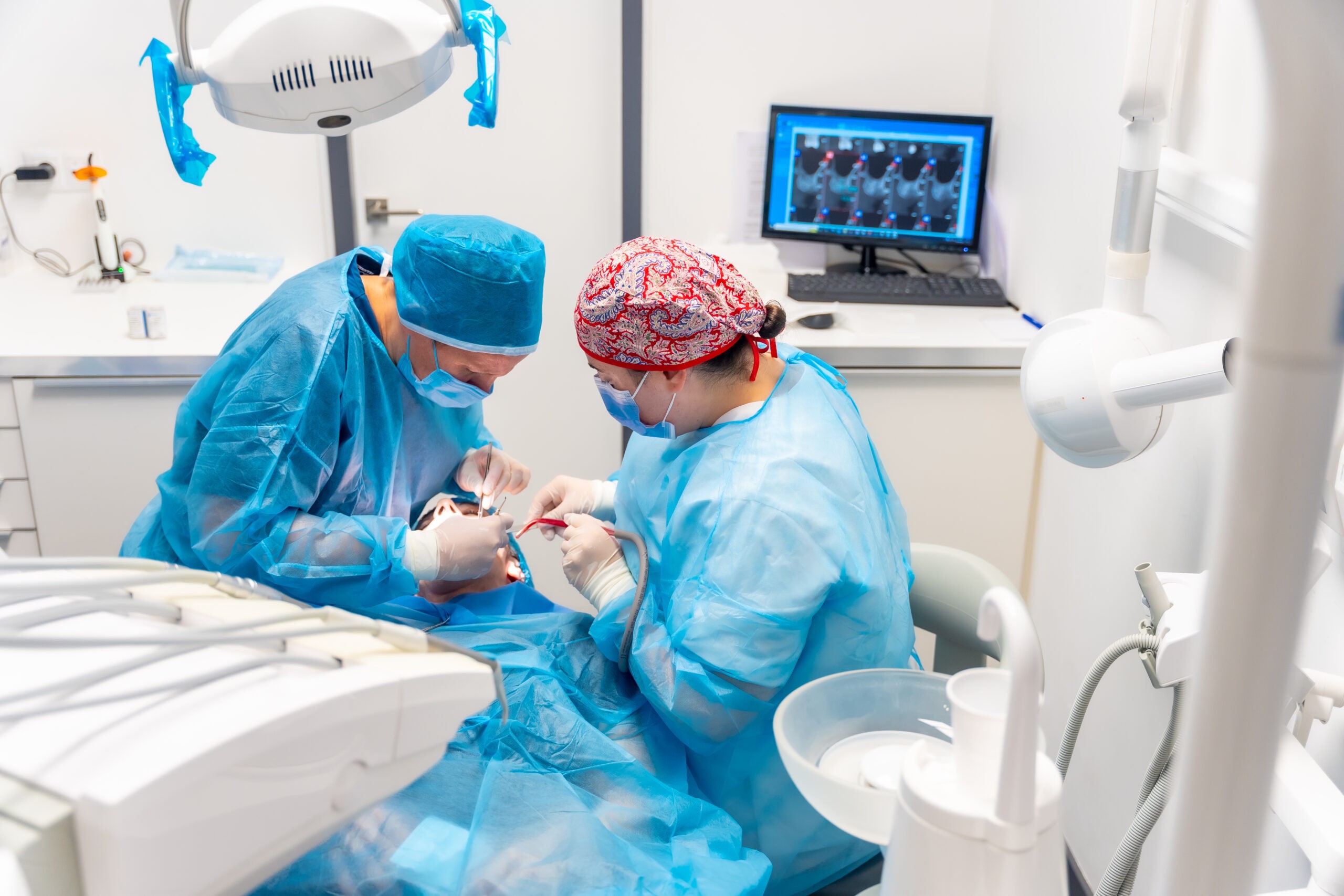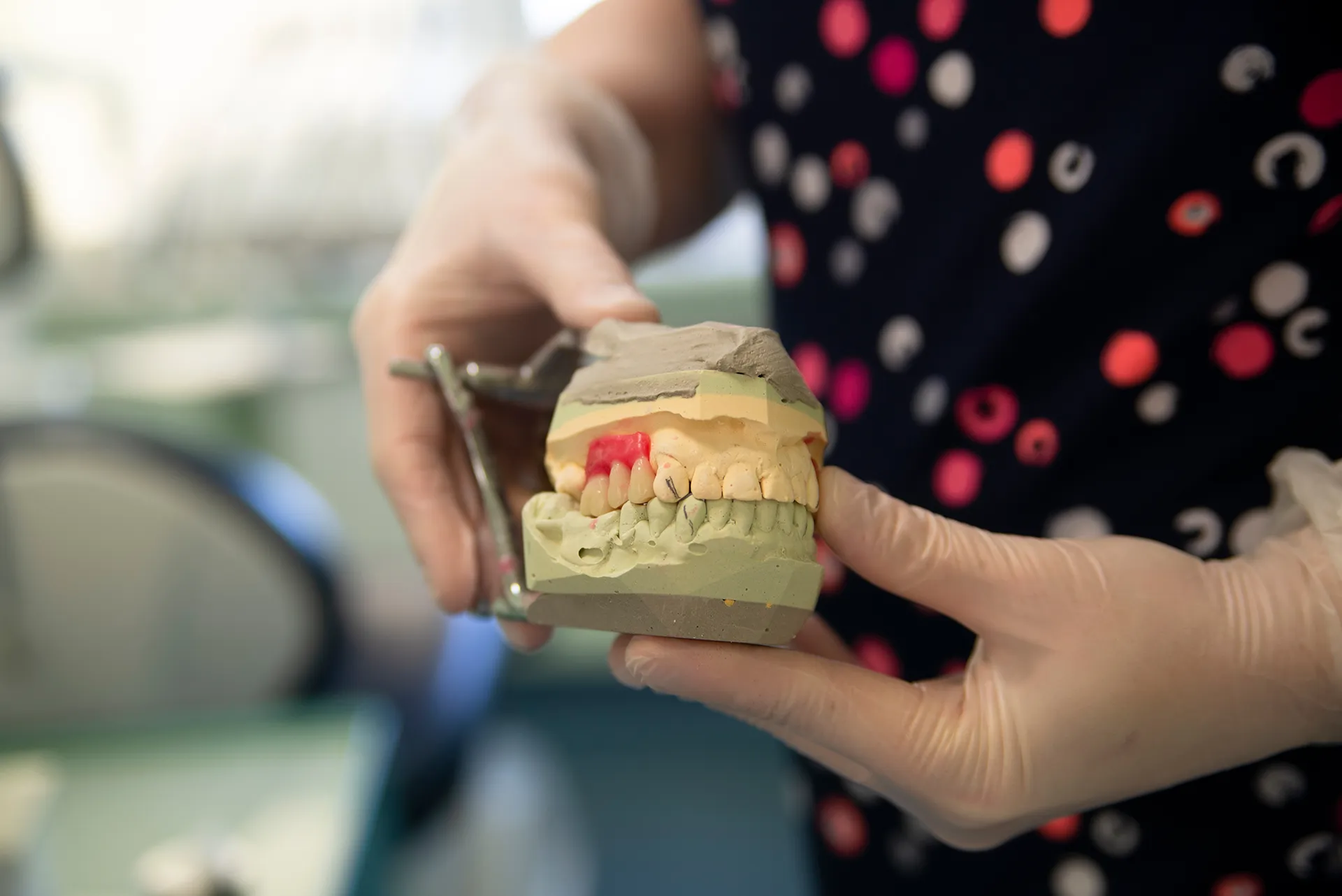Types of Dental Specialties and What They Do
Who is a Dentist?
A dentist is a healthcare professional specializing in preventing, diagnosing, and treating oral diseases. They provide a wide range of services, including general dental check-ups, cleanings, fillings, extractions, and others. Their primary goal is to provide education on oral hygiene and best dental practices. A dentist may work in private hospitals, clinics, or public health settings. Dentists play an important role in maintaining oral health and preventing serious oral diseases. With newer advancements in dental technology, the scope for choosing multiple dental specialties also increases. Dentists typically work in teams to manage complex dental procedures. This includes dental assistants who support the dentist in ensuring smooth procedures and the comfort of the patient.What is the Dentist’s Educational Requirement?
A dentist’s educational journey requires the completion of a four-year dentistry course program and the passing of written and clinical exams from an accredited dental university in Malaysia. This degree is referred to as a bachelor of dental surgery. Additionally, a dentist must also get a valid license to practise dentistry. After earning a dental degree, a dentist can choose to specialize in one of the dental specialties. Alternatively, they can directly get into the field of general dentistry.What are the Different Types of Dental Specialties?
1. Orthodontics
Orthodontists focus on diagnosing, preventing, and treating dental and facial irregularities. Orthodontists specialize in using braces, retainers, and other appliances to correct and straighten teeth.2. Pediatric Dentistry
Pediatric dentists are specialists who look after the treatment of the dental needs of children from infancy through adolescence. They possess the right knowledge and skills to provide children with preventive and therapeutic care. They can also cater to the unique needs of children and provide specialized dental services.3. Periodontics
Periodontists are those who specialize in the diagnosis and treatment of issues affecting the gums and supporting structures of the teeth. They also look after dental implants and perform cosmetic periodontal procedures.
4. Oral and Maxillofacial surgery
These dental surgeons specialize in the surgical treatment of diseases and injuries. They also look after defects of the head, neck, face, jaws, and other tissues of the oral and maxillofacial region.5. Endodontics
Endodontists are responsible for diagnosing and treating diseases and injuries related to the dental pulp and other tissues surrounding the tooth. They specialize in performing root canals and other procedures to save teeth that would otherwise need to be extracted.6. Prosthodontics
Prosthodontists look after the replacement of missing teeth and streamline other oral structures. This is done using dentures, bridges, and dental implants as well.7. Public Health Dentistry
This specialization focuses on education on the prevention and control of dental diseases. This education is done in groups instead of with individual patients. They primarily work in community health programs, government agencies, and other settings.8. Oral Pathology
Oral pathologists specialize in diagnosing and treating diseases of the oral cavity and surrounding structures. They make use of laboratory and other diagnostic procedures to identify oral cancer and other diseases. They work closely with other dental specialists to plan the treatment and further course of action.
9. Dental Anaesthesiology
Dental anesthesiologists are specialists in administering anesthesia and providing sedation for dental procedures. They work closely with other dental specialists to ensure patients are comfortable and feel safe before and during a dental procedure.10. Dental Public Health
These specialists focus on the prevention and control of oral diseases in populations instead of individual patients. They work as a part of community health programs, government agencies, schools, and other settings.11. Oral and Maxillofacial Pathologist
This specialty of dentistry deals with the nature, identification, and management of diseases that cater to the oral and maxillofacial regions. It combines the discipline of pathology with the treatment of diseases.12. Oral Medicine
This is the specialty that looks after the oral healthcare requirements of complex patients and the diagnosis of medical-related diseases, disorders, and conditions.In Closing
Dental specialties form an integral part of the dental profession. Each specialty focuses on a specific dental area to ensure the right dental care is provided to patients. Each dentist enhances his skillset through a specialty. From orthodontics to public health dentistry, these specialties work together to provide comprehensive care for patients of all ages.Post-Pandemic Business Ideas that You Can Consider Now
Although the effects of COVID-19, particularly on the corporate sector, could not have been expected, they have been a tremendous learning opportunity, particularly for budding entrepreneurs. Traditional physical establishments like restaurants, brick-and-mortar stores, and event services have been forced to find innovative solutions to stay afloat because of social distancing and remote work. This has also created a wealth of opportunities for business owners to adapt to the changing needs of their customers. Since entrepreneurs are, by nature, innovative, creative, and risk-takers, starting a company during or right after a pandemic is their forte. Some of them also complete a diploma in business to understand the business world. Moreover, entrepreneurs can fill several niche markets or gaps in the digital market to take advantage of unmet consumer demand and put themselves in a good position in the competitive market. For instance, if they have a bachelor's degree in accounting and finance, they can contribute to sectors such as banking, auditing, investment analysis, and management professions. There are six core elements in business: vision, leadership, management and operations, marketing and sales, money, and culture. These form the core of any successful business today. Here are some excellent ideas to consider, whether you're starting your own business or updating the goods and services you presently provide to meet the needs of a shifting market.
1. Production of Handmade Items
E-commerce has always held a significant position in the economy. The pandemic demonstrated both the tenacity of online retailers and the desire of the public to purchase from small and local businesses. Online storefronts are the best option for ambitious retailers of handcrafted goods like hand-knitted gloves, infused olive oil, and more. Crafters and craftsmen have a special chance to gain a following on social media platforms like Instagram and TikTok and transform their enthusiasm and expertise into a successful company on platforms like Etsy.2. Dropshipping Business
Many people are using online shopping options to get easy access to goods and experience convenience. People no longer desire to visit a store, stand in line, and then commute home, just to buy a product. Instead, they anticipate quickly receiving what they want after clicking a button. Dropshipping is a terrific method for profiting from this emerging retail trend. Dropshipping is a tried-and-true business strategy that thrives in any market.
3. DIY Beauty Products
People learned to adapt by developing their beauty rituals under quarantine when hair and nail salons were closed during the Malaysian Movement Control (MCO). Even when lockdowns have been eased, customers might still be more willing to experiment with novel beauty items while treating themselves at home. Even after the pandemic is over, according to industry analysts, demand for goods that promote holistic well-being and self-care, such as facial creams, essential oils, and aromatherapy, will continue to be strong.4. Commercial Cleaning Service
As cleaning and antibacterial goods flew off the shelves in 2020, demand for various corporate cleaning services surged more than ever. Office buildings, restaurants, and other public facilities continue to rely on these service providers to maintain a clean environment and the security of their employees and patrons. With a higher demand, business owners can consider coming up with a service in this space.5. Errand and Delivery Services
By 2023, online food delivery services are expected to grow by more than $104 billion, making on-demand delivery a very popular business. Start your own independent courier business, deliver groceries and other necessities, and carry out other duties like collecting prescriptions.
6. Transcription Service
Listening to voice recordings and turning them into written text is a unique business that has been around for a long time and continues to meet the needs of many businesses. Transcription services are an intriguing online industry primarily employed in the medical sector. The best transcription services use high-quality transcriptions that have been checked by native English speakers for accuracy, spelling, punctuation, and data. Aspired entrepreneurs with a good command of English can start off by taking up transcription work in a freelance setting and then explore options to create their own company.Final Takeaways
A bachelor of marketing degree gives graduates the fundamental skills they need to compete in a range of in-demand professions in public and private contexts. These skills include marketing research, social media marketing, and advertising techniques. You can kickstart anything in this new economic environment, from developing in-person interactions to utilizing internet trade. The sky is the limit as long as you practise patience and perseverance. Earning a marketing degree or getting started with a foundation in business is definitely a good start.How Does Electrical Engineering Impact The World?
Look around your house at every electrical invention ever made. From using electricity for light to the introduction of electric cars, technology is getting better and better every day. Who is behind these inventions? Someone somewhere is making an effort to transform the way we use technology. These are people with an electrical engineering degree who are taking the right steps toward technological development. According to a recent report released by MarketsandMarkets, the global market for electrical engineering is projected to reach $1.2 trillion by 2022, growing at a CAGR of 6.2%. The demand for electrical engineers is on the rise since the world is advancing at a rapid pace. Today, electrical engineers have managed to significantly impact the world at large through their contributions across various fields and industries. Be it consumer-centric or business-led, electrical engineers have impacted our world in multiple ways for the better. Here are some ways in which electrical engineers are transforming and impacting the world:
1. Power Generation
Electrical engineers have played a significant role in designing and building of power plants. These power plants generate electricity from multiple sources like coal, natural gas, nuclear, hydro, and other renewable energy sources as well.2. Transmission and Distribution
Electrical engineers have helped develop the infrastructure required to transmit and distribute electricity to every nook and cranny of home and business. Electrical engineers are responsible for everything from the design and construction of power lines, substations, and transformers.3. Telecommunications
Electrical engineers have been at the forefront of developing and improving telecommunication systems across the globe. From the early days of using telegraphs and telephone systems to the advent of mobile phones and internet connectivity, electrical engineers have pioneered in making communication and reliability faster and more convenient.
4. Computing and Information technology
Electrical engineers have played a vital role in modern computing and information technology development. Right from the time the first electronic computers were made to today’s supercomputers and smartphones, electrical engines have not only designed but also built the hardware and software of these devices.5. Transportation
Due to the help and advancements put forth by electrical engineers, today, transportation is seen in a completely different light. These engineers have helped design electric motors, battery management systems, and infrastructure requirements to make electric vehicles a viable alternative to gasoline-powered cars.6. Medical Technology
When it comes to the design and development of various medical technologies, electrical engineers have played an important role. Today we have managed to experience medical advancements like imaging systems, diagnostic equipment, and prosthetic devices thanks to the developments of electrical engineers. These technologies have helped boost healthcare effectiveness in diagnosing and treating illnesses of various kinds.7. Robotics and Automation
Electrical engineers have managed to develop various types of robots and automation systems. The robots are extensive in nature, right from industrial robots that perform various tasks in manufacturing plants to drones and autonomous vehicles that can be used across industries. Electrical engineers have played a major role in making these technologies possible.
8. Energy Efficiency
Improvements in energy efficiency in the building and industrial processes can be attributed to the efforts of electrical engineers. The tasks include designing and implementing systems that make use of renewable energy sources like solar and wind power as well as developing energy management systems that help buildings and factories use energy in a more efficient manner.9. Infrastructure
Electrical engineers look after the design and construction of various types of infrastructure, including but not limited to bridges, tunnels, and highways. The advent of smart cities and the Internet of Things (IoT) can also be attributed to the hard work of electrical engineers.10. Consumer Electronics
Today, we use multiple electronic appliances in our household for varied needs. All of these are designed and developed by electrical engineers. Electronics like television, cell phones, laptops, and home appliances have impacted the world drastically. These products have greatly improved the quality of life for people around the world.Conclusion
People with a diploma in electronic engineering have greatly impacted the world positively. They have played a vital role in shaping the way the world is perceived today through their contributions to various fields and industries. Their work has led to the development of technologies that have made our lives easier, more convenient, and more connected. Their role in the future is only expected to increase as the demand for technological advancements goes up.Beef up Health Systems
The Covid-19 pandemic has changed the healthcare approaches of patients and medical practitioners. Hence, we should reflect on healthcare highlights in 2022 and discern trends relating to healthcare approaches for patients and practitioners. Accordingly, Dr. Madhumita Sen, Deputy Director of the Clinical Skill Centre at the Faculty of Medicine, has enlisted concerns and trends relating to the pandemic in an article titled, ‘Beef up Health Systems.’ The timely article got featured in the letters to the editor column of NST on 26 January 2023. Click to read
Drawing lessons from Covid pandemic
Many experts expect Covid-19 to become endemic when its presence becomes steady in a region, or at least predictable and manageable like seasonal influenza. However, endemicity does not mean that the virus will disappear. Learn more about Covid-19 and its current state in an article by Professor Dr. Yu Chye Wah and Associate Professor Dr. Chew Heng Hai, both from the Faculty of Allied Health Professions. The article, ‘Drawing lessons from Covid pandemic,’ got featured in the letters to the editor column of NST on 21 January 2023. Click to read
China’s growth will cushion against downturn in Malaysia
With the relaxation of Covid restrictions, ease of financing for its beleaguered property sector, and alleviation of the supply crunch, China is expected to grow at a decent clip of five per cent in 2023. China's growth should cushion against any downturn of Malaysia's growth from slowing domestic consumption, investment, and exports due to the global recession. Learn more about these circumstances in an article by the Vice-Chancellor of AIMST University, Professor Datuk Dr. John Antony Xavier. The article got featured in the columnist section of NST on 16 January 2023. Click to read
2022’s big lesson: We need each other
The Russian invasion of Ukraine, containing the spread of Covid-19, and the outcome of the 15th General Election are lessons to be learnt in 2022. These lessons allow us to assess whether we are still on the road to our dreams and how far more we must go. Learn more about it in an article by the Vice-Chancellor of AIMST University, Professor Datuk Dr. John Antony Xavier. The article, ‘2022's big lesson: We need each other,’ got featured in the columnist section of NST on 14 January 2023. Click to read
What is the Career Path in Banking?
A banking career refers to any position within a financial institution. Common banking careers include bank tellers, accountants, trust and investment bankers and bank administrators. A career in banking is something most individuals can pursue, and some positions do not require higher education. Banking is considered a service industry, so a primary requirement for individuals is honesty and trustworthiness.
Why Would One Pursue a Career in Banking?
The benefits of pursuing a career in banking are many, with the most prominent being:- Competitive salaries
- Great job benefits, including medical insurance, paid time off, sick leave and disability insurance
- A range of administrative positions to choose from
- Job security
- Opportunities for advancement in the career
- Good working conditions and reliable hours
- Career development opportunities
1. Accountant
Responsible for ensuring financial statements and records are up-to-date and abide by regulations and generally accepted accounting principles.2. Commercial Banking Officer
They work in commercial bank settings such as credit unions and mortgage companies. A commercial banking officer’s duties include offering loans to clients, helping clients determine the most appropriate financial services and products for their needs and goals and building relationships with current and new clients.3. Credit Analyst
Being responsible for determining the risk profile and creditworthiness of businesses and individuals is part of a credit analyst’s daily routine. They perform financial background checks, analyse financial statements and credit history, perform risk assessments, review credit applications, and work with clients regarding payment terms and credit limits.
4. Bank Compliance Officer
Such an officer is responsible for ensuring financial institutions comply with governmental laws and regulations. Their everyday work includes liaising with bank management to make sure the financial institution's procedures and policies are up to date and overseeing deposits, consumer lending and mortgage lending to ensure they comply with the appropriate rules and regulations.5. Bank Marketing Manager
Like any other marketing profession, a bank marketing manager is also responsible for creating content and ideas to draw in new clients to the bank or financial institution. They do competitive studies, design marketing plans for advertising and signage, create direct mail campaigns, and update banking clients on business news.6. Trust Officer
Most banks have a trust department. A trust officer is responsible for creating, implementing and overseeing every aspect of a bank's trust department. A day in the life of a trust officer includes providing advice on trust and estate matters, working with clients, advisers and agencies regarding regulations and options related to estates and trusts, helping clients make financial decisions and overseeing trust funds.7. Bank Operations Manager
Oversee the operations department of banks and other financial institutions is the purview of a bank operations manager. An operations manager’s day includes making sure products and services are efficiently delivered to clients, developing and implementing procedures and policies within the bank setting, managing staff and developing and overseeing goals aimed at improving the bank's productivity and efficiency.8. Bank Human Resources Manager
Being responsible for employee engagement and relations, ensuring the bank follows compliance with human resource regulations and policies within a bank or federal setting and creating and overseeing recruiting and retention plans are all part of a bank’s human resources manager’s work.9. Broker
Provide people and organisations with services related to investments, insurance, and real estate within the banking and financial sectors.10. Financial Adviser
Provide personalized financial services to customers. Common duties include assisting clients in selecting the right investments for their goals and preferences, monitoring investments, assisting clients in choosing insurance plans and preparing financial plans for customers.
11. Systems Analyst
Systems analysts who work for banks and other financial institutions identify potential data processing issues and gaps in banking systems. They also implement new computer systems to meet the bank's needs, design and test solutions and standards and assess system problems.12. Wealth Manager
Financial specialists who work with wealthy individuals and businesses. Common responsibilities of wealth managers include counseling customers on the most appropriate financial services and products depending on their objectives, managing client investments, providing estate and tax planning services, and developing personalized financial plans for clients.13. Loan Officer
Financial professionals oversee the approval of real estate, credit and business loans. This is an entry level position that involves providing customer service and basic banking services to the bank's customers.14. Financial Clerk
Responsible for a variety of financial administrative services, including processing invoices, managing financial records, keeping track of transactions, and reviewing financial information and documents.15. Investment Banking Associate
Work with clients to determine their financial goals and needs and create solutions to meet those needs. Duties include evaluating their financial data, creating new fund sources, performing valuation analysis, and overseeing client transactions.16. Auditor
Certified accountants help organizations and individuals ensure their financial records are accurate and meet compliance requirements.In Closing
Many roles in the banking industry do not call for a high level of qualification. Because the banking sector is considered to be a service industry, one of the major requirements for individuals is that they be honest and trustworthy. For more information on banking courses, including bachelor in finance, bachelor of accounting and finance, a diploma in finance, please make an appointment with our helpful course and career counsellors for a full counselling session.MBBS vs. MD: What is the Difference?
The path towards becoming a doctor with an MBBS degree is a long and challenging one. It is a selfless and dedicated service, personally one of the most fulfilling careers. To enroll in the MBBS and subsequent MD, a good grade is required, as well as complete commitment to the course. When we mentioned the degrees in medicine, we brought up two degrees. One is the Bachelor of Medicine and Bachelor of Surgery, commonly referred to as MBBS. The other one is the Doctor of Medicine, more commonly referred to as an MD. With the term "Doctor" in Doctor of Medicine, we can assume that in most universities, it would be the second step after completion of MBBS. However, there are some universities that would award the Doctor of Medicine, MD, as the first step, and the next would be the PhD. As a PhD qualification by research, we would need an MBBS and a master’s degree or specialist qualification to qualify for the programme. In Malaysia, both the MBBS and MD are bachelor’s degrees and are of the same level of qualification. To pursue this programme, one needs a pre-university or foundation qualification (e.g. A Level, STPM, Foundation in Science).
Length of the Course
The standard course length of the MBBS/MD course in Malaysia is 5 years. For the universities that offer MBBS in Malaysia as a graduate entry level medicine program, the course length is 4 years.
Course Matters
Both the MBBS in Malaysia and the MD in Malaysia courses, include two phases—pre-clinical training and clinical training. During the first two years of the degree, the studies would focus on pre-clinical training, where the theoretical aspects of basic medicine science are covered. Thereafter, under clinical training, one gets hands-on training at hospitals and clinics. During the initial training days, students may experience the following common themes:- Basic medical sciences
- Patient and population
- Life Cycle
- Life Support
- Population Health
- Professionalism and Ethics
- Professional Skills
- Communication principles for effective health care
- Allergy and Immunology
- Cardiology
- Emergency Medicine
- Internal Medicine
- Neurology
- Obstetrics and Gynaecology
- Paediatrics
- Pulmonology
Can one become a doctor with either an MBBS or MD degree in Malaysia?
In Malaysia, both the MBBS and MD (undergraduate) degrees are recognized as doctoral degrees by the Malaysian Medical Council. In addition to the degree, one needs to complete housemanship and the necessary training before completing the full registration as a medical officer and using the abbreviation “Dr.” in front of their name. Earning an MBBS means that students are certified to care for patients. Junior physicians do not have any specialized training. Graduates are expected to complete two years of additional training, which rotates them through different specialties. Once they identify a specialty they like, they can apply for additional training, which can take anywhere between three and eight years.MBBS vs. MD
MBBS graduates are considered qualified doctors who can treat basic health matters while they continue acquiring additional training. In that regard, they are similar to MD graduates in the US, who are expected to complete a three-year residency after finishing medical school. An MD is a post-graduate degree onto which the MBBS students enrol to enhance their knowledge and skills.
Scope of MBBS vs. MD
The medical field is highly dynamic, and a graduate with a medical degree can get jobs in public or private hospitals. An MBBS graduate who is licensed and registered under the medical council of the residing country has all the rights to practise their area of expertise. MD is a post-graduate program that helps MBBS graduates prosper in a particular field of specialization. For instance, Clinical Haematology, Oncology, Paediatrics, Cardiology are some of the specializations in the medical field. Indeed, earning an MD degree would enhance the career prospects of a doctor in the long run. If earning a MBBS or MD medical degree does not sound interesting, there are other fields in the healthcare sector that can be explored:- Nursing
- Public Health
- Social Work
- Health Care Administration
Conclusion: Which course should one choose, MBBS or MD?
Both MBBS and MD programs in Malaysia comply with the standards set by the Malaysian Medical Council and the Malaysian Qualifications Agency to provide the right knowledge and skills to become qualified doctors. People consult both specialists and general physicians for a differential diagnosis. Hence, both MBBS and MD doctors are essential in the healthcare sector. For further information, please feel free to get in touch with our friendly course and career counsellors.How Often Should You See Your Dentist?
Dentistry, usually referred to as dental medicine or oral medicine, is the medical specialty concerned with the teeth, gums, and mouth. It entails the study, diagnosis, prevention, management, and treatment of illnesses, disorders, and conditions of the mouth, with the dentition and oral mucosa as its primary focus.
Dental Technology
Dental technicians (also known as dental technologists) create dentures, crowns, bridges, and dental braces to enhance patients' looks, speech, and chewing abilities. Dental technology is the process of designing, constructing, repairing, or modifying dental prosthetic, restorative, and orthodontic equipment. A dental technologist (dental laboratory technician) is a member of the dental team who, upon prescription from a dental clinician, constructs custom-made restorative and dental appliances. Dental technology has subjects that focus on a comprehensive digitized approach to three major fields – Prosthodontics, Implantology and Orthodontics. The course offers training in virtual treatment planning and computer aided designing and milling of dental prostheses.What is the difference between a dentist and a dental technician?
While dentists are responsible for caring for patients by preventing and treating problems affecting the mouth and teeth, dental technicians develop the actual equipment needed to support this. As mentioned by the World Health Organization, oral health is the state of the mouth, teeth and orofacial structures that enables individuals to perform essential functions such as eating, breathing and speaking, and encompasses psychosocial dimensions such as self-confidence, well-being and the ability to socialize and work without pain, discomfort and embarrassment. Oral health, which varies from infancy to old age, is essential to general health and enables individuals to participate in society and realise their full potential. Oral diseases include dental caries, periodontal (gum) disease, tooth loss, oral cancer, oro-dental trauma, noma, and congenital malformations including cleft lip and palate.
How often should one go to the dentist?
It is a standard recommendation throughout the country that children and adults should visit the dentist once every six months. This would be for a regular checkup of the overall oral health, including the status of the teeth and gums and/or underlying issues that may become an issue later. However, for some of the cases below, the dental practitioner will want to have more frequent checkups:- Pregnant women - as fluctuating hormones may put expecting moms at greater risk of developing gum disease and cavities.
- Cancer patients - medications that dry out the mouth and put patients at greater risk
- Diabetic patients - contribute to gum and other oral health problems
- Smokers - tobacco causes gum disease and also makes it harder for the body to heal after dental procedures or surgeries.
- Heart patients - poor oral health has higher rates of cardiovascular problems compared to people with healthy mouths.
- X-rays
- Cleaning and polishing
- Oral cancer screening
- Cavity detection
- Condition of the existing dental work
- Assessment of gum health
How can one become a dental surgeon?
In Malaysia, the appropriate dentistry course would be a Bachelor of Dental Surgery. A Bachelor of Dental Surgery in Malaysia is a 5 year course. The specializations in the dentistry course are:a. Oral and Maxillofacial Surgery
The surgery of the face, mouth and jaws.b. Orthodontics
Deals with the diagnosis, prevention and correction of mispositioned teeth and jaws.c. Restorative Dentistry
Refers to the management and operations your dentist undertakes to maintain the health and functionality of your mouth. This encompasses the placement of dental implants, dentures, fillings, and crowns.d. Periodontology
Study of the specialized system of hard and soft tissues that support your teeth and maintain their positions in the jaw.e. Pediatric Dentistry
Specializes in the oral health of children from infancy through the teen years and provides care for a child’s teeth, gums and mouth throughout the various stages of childhood.
In Closing
Globally, an estimated 3.5 billion people suffer from oral diseases that are non-communicable in nature. This single statistic is reason enough to visit a dentist as a preventative measure that improves one's overall health and makes things easier for us in the long run. All in all, it is recommended for children and adults (except for those who are pregnant or have the aforementioned health conditions) to visit the dentist once every six months. For further information regarding dentistry courses, including dental university in Malaysia, please schedule an appointment with our professional counsellors for a full counselling session.Challenges Faced by Malaysian Pharmacists
The pharmacist serves as a bridge between patients and doctors, giving patients guidance on how to get the most out of their medications while minimizing any unwanted or harmful effects. Moreover, they educate customers on their medication options according to the prescription provided by their doctor. Aside from filling prescriptions and labelling medication, they may also recommend over-the-counter medicines for minor health issues. It is also possible that pharmacists advise customers on the proper dosage, frequency, duration, drug interactions, and side effects of their purchased medicines.
How Can One Become a Pharmacist in Malaysia?
One needs a bachelor’s degree in pharmacy and work experience to enter this role. A pharmacy degree in Malaysia is a Bachelor of Pharmacy from a university accredited by the Pharmacy Board under the Ministry of Health in Malaysia. This usually takes three to four years to finish. After completion of the pharmacy degree in Malaysia, there are various areas of pharmacy practice. Let us look at some of them:- Academic Pharmacy
- Community Pharmacy
- Hospital Pharmacy
- Industrial Pharmacy
 But like many medical professionals, pharmacists across the healthcare spectrum today face a number of technical and resource challenges as they strive to provide the best and most efficient medication decisions and patient care.
Here are six key challenges that pharmacists face.
But like many medical professionals, pharmacists across the healthcare spectrum today face a number of technical and resource challenges as they strive to provide the best and most efficient medication decisions and patient care.
Here are six key challenges that pharmacists face.
- Too many disparate resources, that are spread across various platforms. The pharmacist will have to search across various platforms, books, tools and other resources to find the exact drug that is needed.
- Increasing specialty medicines, calls for the pharmacist's demand for the latest drug information as well as patient education materials.
- The constant demand for multitasking, with spending too much time finding the right and trustworthy drug information at the point of care, along with many responsibilities.
- Outdated information across databases. Pharmacists depend on the information being quickly available - includes the latest drug information, recent drug changes.
- Human and financial cost of medical errors. It is imperative for pharmacists to have access to efficient, accurate information to avoid errors and adverse patient outcomes.
- Awareness of specific patient population needs: A patient’s age, gender, and even history of substance abuse can play a key role when it comes to prescriptions. Pharmacists must understand how to negotiate nuanced interactions and provide supporting resources, such as advising a patient on the timing of doses
- Inexperienced pharmacists starting a pharmacy
- Aggressive price undercutting owing to the growing competition
- Job hopping/staff pinching
- Discriminate price differences between doctors and pharmacies
- Excessive promotion/discounts by chain shops that affects the credibility of the individual pharmacies
- Practice pharmaceutical care
 Challenges of private hospital pharmacists
Challenges of private hospital pharmacists
- Lack of recognition
- Look at purchasers only
- Pharmaceutical diagnosis
- Lack of opportunity in training
- Minimal contact with patients
- Too much of paperwork
- Some hospital pharmacies lack equipment like counting machines and relevant software
- No specializations
- Long working hours
- Lack of professional development training
- Out of the mainstream professional activities
- Lack of research opportunities
- Lack of employment flexibility as there are very few manufacturing companies in Malaysia
- Lack of exposure to retail pharmacy
- Lack of exposure to the health supplements industry
- Lack of exposure to government regulatory information
- Low pay scales
- Never involved into decision making

